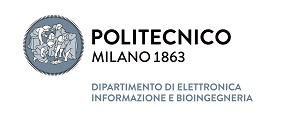Dipartimento di Elettronica, Informazione e Bioingegneria

Politecnico di Milano
Milan
General Information
Introduction
The Dipartimento di Elettronica, Informazione e Bioingengeria (DEIB) is one of the largest European ICT departments. With nearly 1000 members, researchers, collaborators, PhD students, technical and administrative staff, the Department is a vital institution capable of promoting education, fundamental and applied research, and technology transfer to companies. Research is the main focus of DEIB, pursued according to the highest international quality standards. The six department sections cluster consolidated competences in systems and control, computer science and engineering, electronics, telecommunications, bioengineering and electrical engineering. They have a broad network of partnerships with the best international institutions, which makes the Department one of the fundamental players in the worldwide scenario of scientific and technological innovation. DEIB has always been able to attract projects and investments, from both public institutions and private companies, at the national and international level. Stefano Ceri and Carlo Ghezzi in 2008 and Daniele Ielmini in 2015 have been awarded two prestigious European Research Council (ERC) recognitions (Advanced Grant for Ceri and Ghezzi Grants and Consolidator Grant for Ielmini), passing harsh selections. DEIB’s research environment also includes the industrial consortium CEFRIEL and several Spinoffs.
Organisation
Education
Bachelor degree
DEIB primarily supports the courses offered by the School of Industrial and Information Engineering, but its school members also hold ICT courses for all the other Schools of the Politecnico di Milano. Every year the DEIB offers 495 courses, for 3231 Credits.
Master degree
Doctoral Studies/Ph.D. degree
Research
Research Activities
The DEIB pursues ambitious research, educational and societal goals: to be at the cutting edge of research, generating innovative ideas, gaining international recognition, exploiting the synergy among researchers from different Information and Communication Technology (ICT) areas and from other disciplines. The DEIB research is in continuity with the past but also pointing to new directions; its guidelines are: • maintain a focus on long-term, basic and visionary research, funded by agencies and initiatives such as ERC, FET, EU Flagships, or PRIN at national level; • enhance the involvement in medium-to-short-term research focusing mainly on those projects that transfer cutting-edge research results to improve products and services; • enhance the involvement in interdisciplinary research, opening to collaborations with other departments and institutions. Such trend is fully in line with the Horizon 2020 framework program of the European Community, and focuses on a variety of challenges, from supporting the ageing society, to improving transportation, to addressing the climate change to supporting energy-aware society, and to strengthening education, cultural heritage and entertainment; • support and contribute to the innovation processes of industries, public administrations, and the society in general, by understanding needs and problems, analyzing and interpreting market opportunities and challenges, identifying technological trends and directions, providing expertise and methods to design and develop disruptive solutions. To address these complex issues, DEIB will also exploit the partnership with CEFRIEL and with the spinoffs and startups that have been created over the past years.
